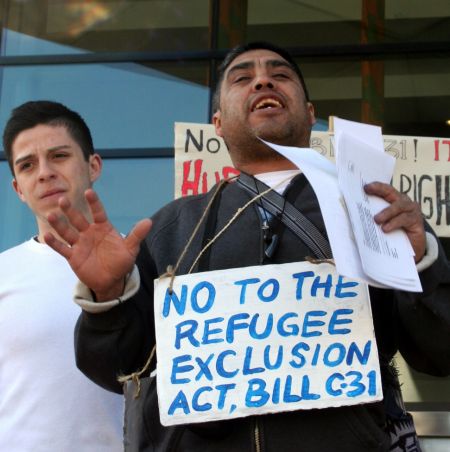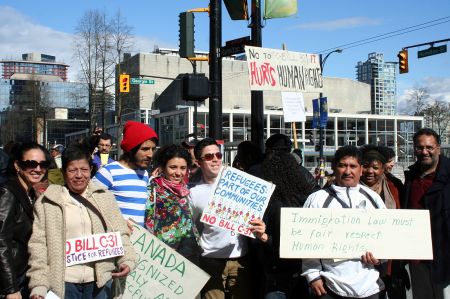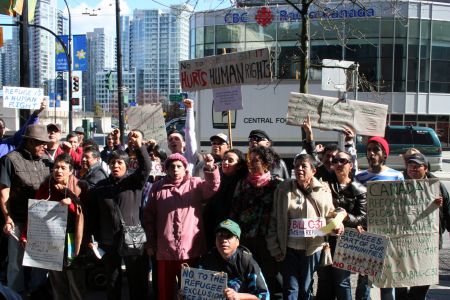STORY about Migration posted on April 5, 2012 by SandraCuffe
Refugee Rights!
Vancouver Latin American Communities Spearhead Rally to Defeat Bill C-31

Oswaldo Godoy, from the organizing committee of the Movement to Protect the Human Rights of Refugees and Immigrants, addresses a rally against Bill C-31. Vancouver, April 4, 2012. Photo: Sandra Cuffe

Rally to defeat Bill C-31. Outside the IRB office at West Georgia and Hamilton. Vancouver, April 4, 2012. Photo: Sandra Cuffe

On Refugee Rights Day, dozens came out to protest Bill C-31. Vancouver, April 4, 2012. Photo: Sandra Cuffe
Also posted by SandraCuffe:
Also in Migration:
Chants against Bill C-31 rang out in Spanish at the intersection of West Georgia and Hamilton on Wednesday afternoon, when dozens of people gathered in front of the Immigration and Refugee Board office to protest the proposed reforms to Canada's refugee determination system.
The rally was organized by the Movement to Protect the Human Rights of Refugees and Immigrants, a nascent coalition spearheaded by individuals and groups from various Latin American communities in Vancouver. With a position of total opposition to Bill C-31, also known as the 'Refugee Exclusion Act' and the 'Anti-Smuggling Bill,' the group coalesced after two well-attended community meetings and decided to call the rally.
"For us, the objective is to raise our voices and tell the government that we are here and we support our communities," Movement organizing committee member Oswaldo Godoy told the Vancouver Media Co-op.
The demonstration followed on the heels of an occupation of the IRB office. Members of refugee and immigrant rights groups including No One Is Illegal carried out banner drops and Conservative MP office occupations in seven cities across Canada on Wednesday, demanding that Bill C-31 be discarded. The actions took place on Refugee Rights Day, celebrating the protection of refugee rights since the landmark Singh Supreme Court ruling on April 4, 1985, which paved the way for the creation of the IRB four years later.
"To be a refugee is a right," Godoy told those gathered outside the IRB office at 300 West Georgia. "We came, escaping, to save our lives."
"Some people have said that this [legislation reform] isn't going to affect us," added Godoy. "Many of us are already Canadians, but this still affects our communities."
Bill C-31 has alarmed many people and organizations dealing with immigration, refugee, and human rights issues. The Canada Council of Refugees has denounced that Bill C-31 "would create a two-tier system of refugee protection in Canada. It makes refugee protection in Canada dangerously vulnerable to political whims, rather than ensuring a fair and independent decision about who is a refugee. It also includes costly measures to detain refugee claimants and to revoke the status of refugees who are now permanent residents."
"This is a massive piece of legislation," immigration lawyer Peter Edelmann explained to the protesters on Wednesday. "A lot of things have been put together into one piece of legislation that's going to be slammed through Parliament very soon."
"The possibility of being detained for investigation at the border is going to go up significantly, both for foreign nationals and permanent residents," said Edelmann. "We're going to see major, major changes."
The details of many of the changes are not found in Bill C-31 itself, but in the regulations, Edelmann explained. While it is known that draft versions of the regulations exist, he added, no copy has been made available.
"What we do know is that Parliamentarians do not understand [Bill C-31]," said Edelmann, expressing concern about plans to pass the legislation before June 29th. "These timelines are very, very short."
One proposed reform that has been cause for concern for many groups and organizations is the designation of 'safe' countries. Refugee claimants from a designated country would be fast-tracked through the system, losing access to both the IRB appeal process and to the possibility of having a deportation order stayed even if they were to have a pending federal court case into the denial of their claim.
"The Minister [of Citizenship, Immigration and Multiculturalism] will have the power to designate countries," Edelmann explained to those attending the rally. He noted that while a previous proposal included requiring a panel of human rights experts to advise the Minister on the designation of countries, the criteria will now be defined by the Minister.
Furthermore, there are elements of Bill C-31 that have been set up to be retroactive. People who are not citizens would be at risk of losing not only protected person status, said Edelmann, but also permanent resident status, if the situation in their country of origin were deemed to have changed and become safe. As an example, he explained that a Chilean who came to Canada as a refugee fleeing the repression of the Pinochet regime decades ago could lose their status if they did not become a Canadian citizen.
"Many of our people [from Latin America] chose not to become Canadian citizens," for fear of persecution in their home countries or because they one day hope to return, Godoy told the Vancouver Media Co-op. "In many of our countries the situation has not changed. Repression still exists."
"If in Mexico, Central America, and in Latin America it is safe, why have more than 46,000 people been killed in Mexico alone in the 'war on drugs'?" rally emcee Byron Cruz asked the crowd, drawing the links between North American foreign policy and immigration patterns. He added that Canadian companies like Goldcorp operate in Latin America with the blessing of the Canadian government: "They exploit our countries. They pay assassins to kill people who oppose the mining exploitation. Why would we then be 'illegal' here [in Canada]?"
While there have been no announcements about which countries would be designated should Bill C-31 pass, it has been widely speculated that Mexico will make the list, particularly because of the close trade and security cooperation between Canada and Mexico under the North American Free Trade Agreement (NAFTA) and other initiatives. Refugee, human rights, and LGBTTI organizations have highlighted Mexico as one example of the danger of blanket country designations, which ignores the diverse realities of groups, communities, and individuals within a country.
"I also want to say that Mexico is not a safe place for us," said Latino/a LGBT community group Dos Mundos member Gisela Molina, refering to the LGBTTI community in Mexico.
Cruz also emphasized the dangers of safe country designation, in light of the many LGBTTI refugee claimants from Latin America: "They are killed every day. Their rights are violated every day."
"We know that these countries are complicit in human rights abuses," No One is Illegal organizer Harsha Walia told the demonstrators outside the IRB office. She also highlighted other aspects of Bill C-31, such as reforms to the power of border enforcement agents, family sponsorship and the temporary foreign workers program: "All of these attacks that we're seeing against refugee rights, especially by the Harper government, is not a coincidence."
"This Canadian government has criminalized all of us, since 9-11. Our rights are being taken away one by one," said a representative from the Canadian Muslim Union. "It's going to be a tough battle, but we have to fight on so many fronts."
As the rally came to an end mid-afternoon, members of the organizing committee for the Movement to Protect the Human Rights of Refugees and Immigrants encouraged those present to spread the word and to stay tuned via facebook or email - no2billc31(at)gmail.com - for updates about upcoming actions and events.
"Many comrades were disappeared - murdered - and were never found, and we are here because of them," said Wilson Muñoz of the Coalition of Progressive Electors (COPE). "We are going to defeat this Bill C-31, but not by sitting at home!"
Sandra Cuffe is a journalist and aspiring janitor currently living in Vancouver.
The site for the Vancouver local of The Media Co-op has been archived and will no longer be updated. Please visit the main Media Co-op website to learn more about the organization.